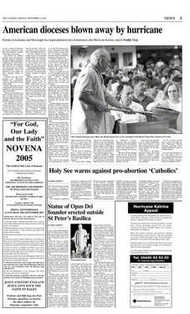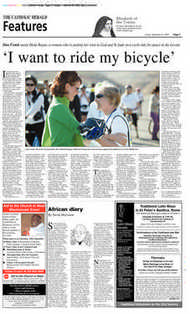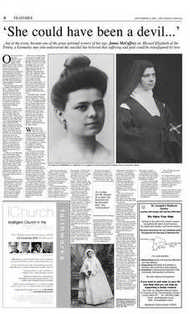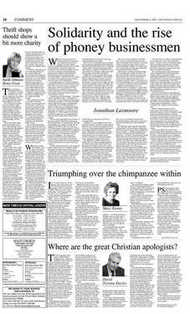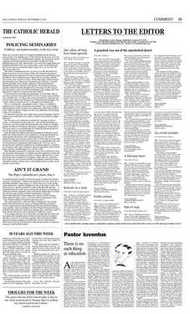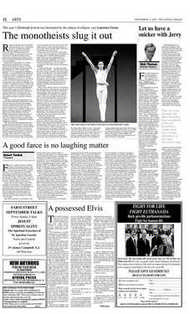Page 1, 9th September 2005
Page 1
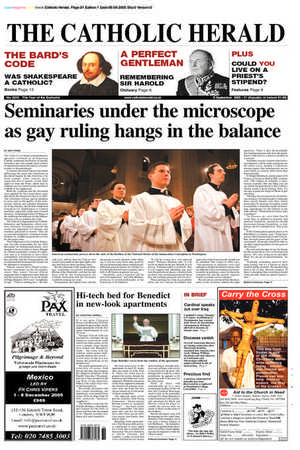
Report an error
Noticed an error on this page?If you've noticed an error in this article please click here to report it.
Tags
Share
Related articles
B Asis Of The Training Priests Who Received Their...
Us Cardinal Names Seminary After John Paul Ii
The Catholic Herald
American Unease At Vatican Seminary Study
Vatican Notes Progress In Us Seminaries
Seminaries under the microscope as gay ruling hangs in the balance
BY DAN FRANK
THE VATICAN is to begin a comprehensive apostolic visitation of all American Catholic seminaries and houses of priestly formation later this month amid a flurry of speculation about the future of homosexuals in the priesthood.
A rumour-shrouded Vatican document addressing the issue also resurfaced at the end of August. Its fate, however, is far from certain: some sources have suggested that it merely awaits final approval from the Pope; others that its contents are too controversial and that it is likely to be suppressed.
Both the visitation and the document were sparked by the sexual abuse crisis that shook the American Church in 2002. The visitations will pay special attention to areas such as the quality of the seminarians’ human and spiritual formation for living chastely, and of their intellectual formation for faithfulness to Church teachings, especially in the area of moral theology. Archbishop Edwin O’Brien of the American Archdiocese for the Military Services will co-ordinate the visits.
The Vatican Congregation for Catholic Education and Seminaries, which oversees seminary formation around the world, has appointed 117 bishops and seminary personnel as visitors. They are to visit each institution, working in teams of three for smaller programmes or four for the larger ones.
The Congregation for Catholic Education was also responsible for the 2002 document on homosexual priests, now thought to be on its third revision. Though its content is primarily a matter of conjecture and it is believed to have been substantially watered down it is nonetheless possible that the Congregation will recommend that homosexuals should not be admitted to seminaries.
Vatican sources have offered contradictory comments on the document’s status. One senior Vatican official suggested that it might have been shelved, and that rumours that it was in the hands of Pope Benedict XVI were “completely wrong”. “There is nothing new,” the offi cial said, adding that the Vatican last issued a document on the topic eight years ago and had not done anything since.
But the chairman of the American bishops’ committee on priestly formation, Bishop John Nienstedt, said that he had been told by the Congregation for Catholic Education that the document would be coming out soon.
Some priests and experts have said the document is sorely needed, while others say it will do more harm than good by driving homosexual priests underground. Although precise figures are not known, it is thought that between a quarter and a half of all American priests are gay.
“Inevitably, such a directive will be met with opposition,” said John Haldane, professor of moral philosophy at the University of St Andrews. “It will be written in a very pastoral mode,” Professor Haldane said. “It will not be an attack on the gay lifestyle. It will not say ‘homosexuality is immoral’. But it will suggest that admitting gay men into the priesthood places a burden both on those who are homosexual and those they are working alongside who are not.” Those pushing for a ban on gay priests often cite two Vatican documents that make clear that homosexuals should not be ordained. One issued in 1961 says: “Advancement to religious vows and ordination should be barred to those who are afflicted with evil tendencies to homosexuality or pederasty, since for them the common life and the priestly ministry would constitute serious dangers.” But not all are convinced that the document, or the visitation, address the right questions. There is also the possibility that banning homosexuals from the priesthood would lead to a massive decline in vocations.
And there remain concerns that homosexual priests will be made scapegoats for the abuse crisis, despite a consensus among experts that homosexuals are no more likely to commit child abuse than heterosexuals.
Fr Shaun Middleton, parish priest of St Francis of Assisi in Notting Hill, London, said: “The subject of sexuality is enormously complex. But one thing you can say about the priesthood is that celibacy should create a level playing field. It’s too easy to point the finger of blame at just one thing.
“Perhaps the real questions should be: can seminary life help people to integrate their sexual identity into their whole personality? Is seminary formation, which is essentially a Tridentine model of formation, appropriate for the Church in the 20th century? What kind of culture does it produce?
“In Pastores da vobis John Paul II wrote that, in addition to pastoral and spiritual formation, seminaries should encourage human formation, so that priests can live fulfilled lives. This is the key.” Fr Kit Cunningham, parish priest of St Etheldreda’s, London, said: “There have always been homosexuals in the Church. But, through prayer and the grace of the sacraments, all people should be able to use their natural qualities for the good of the Church.” He criticised attempts to lay the blame for the sexual abuse crisis on homosexual priests. “It’s very wrong to try and label them. It’s an act of discrimination,” he said.
“Certainly something seems to have gone wrong, but it’s a failure to teach sound Catholic doctrine. We should bring back a bit of that old-time religion. If there is discipline then everything should work out well, whatever a priest’s proclivities.”
Editorial Comment: Page 11
blog comments powered by Disqus






